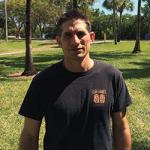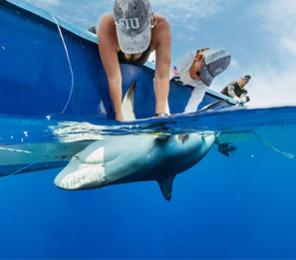
Yannis Papastamatiou, Ph.D.
What do you enjoy most/what do you find most interesting about your research topic?
I love to dive and explore new areas underwater. I also love finding out new things about sharks and rays. I find it fascinating that we can explain why sharks behave the way they do or why they use the habitats we find them in.
How does citizen science support your research?
There are a few different ways my research has involved citizen science. One is through shark ecotourism where operators collect data on what sharks they see. They are out in the field almost every day of the year, far more than I could ever manage, so collect a vast amount of information. The other way is with volunteers from programs such as Earthwatch. Our fieldwork often requires a lot of bodies in the field. Citizen science provides us with access to large numbers of volunteers who are very keen to be involved with research. We are able to accomplish a lot more than we would have been able to with our field research team alone.
What is one of your favorite moments in the field?
I was part of a research team surveying the deep reefs (50-80 m) of the very remote northwestern Hawaiian Islands. We were the first team to ever survey these depths so were seeing reefs that no human had ever visited. We had steep ledges with fields of black coral, and sharks and jacks swimming down through the coral fields. It was true exploration and a sight to behold.
Education
- Ph.D. in Zoology, University of Hawaii at Manoa, HI (U.S.)
- M.S. in Biology, California State University, Long Beach, CA (U.S.)
- B.S. in Oceanography, University of Southampton (U.K.)
